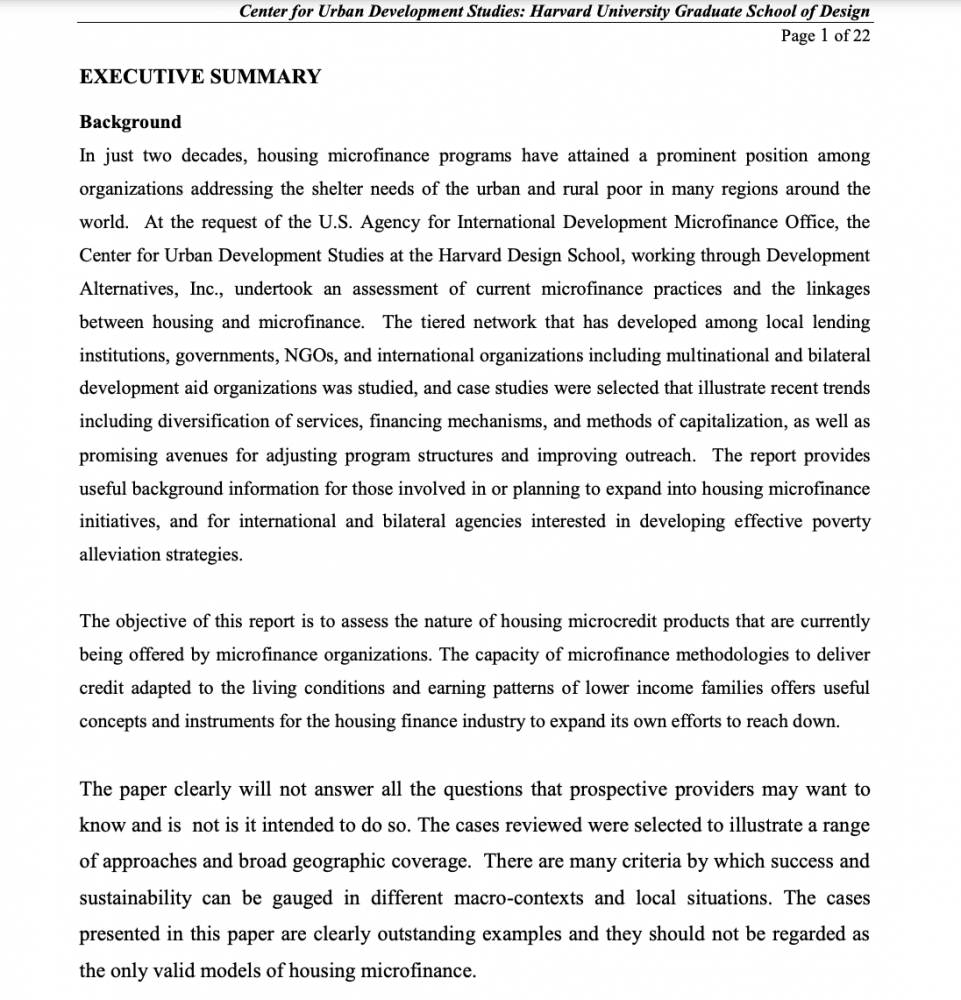Abstract
Curriculum components from the 2001 IEP held in Eastern Cape, South Africa, from May 14-18, 2001. The report, titled “Infrastructure Planning and Partnerships for Local Economic Development,” and related documents include case studies and excerpts of CUDS reports used for the seminar.
Excerpt
[Excerpt: Executive Summary, May 2001, p. 1]

See related I2UD projects below
Related I2UD projects
A History of ITP and IEP Seminars
The International Training Programs (ITP) began in 1982, as 2-4 week long summer seminars held by the Unit for Housing and Urbanization (Harvard University) in Cambridge, MA. ITP curriculums were designed to strengthen the decision-making skills of senior professionals in public and private agencies responsible for urban development.
The I2UD Digital Library holds curriculum materials for ITPs from 1988, 1991, 1994, 1995, 1997 and 1998:
- ITP 1988: “Housing Affordability: Project Appraisal and Program Structure” with Boston Redevelopment Authority Site Visit and Documentation, 1988
- ITP 1991: Development Strategies for Urban Regeneration of Old Urban Fabric: Case Studies and Curriculum
- ITP 1994: Revitalization in Older Urban Spaces: Upham’s Corner, Dorchester, Boston, South Boston, New Haven (USA); Montpellier (France), Cork (Ireland), Case Studies and Curriculum
- ITP 1995: “Linking Economic and Physical Development Strategies Intergovernmental Responsibilities in the Context of Decentralization”
- ITP 1997: “South Boston Metropolitan Area Community Housing,” Case Studies and Curriculums, Boston, Massachusetts, 1997
- ITP 1998: “The Role of Public/Private Partnerships in Urban Improvements,” with Case Studies on Kreuzberg, Berlin (Germany), GIS Mapping on Cape Cod (US) and the Maarouf Quarter of Cairo (Egypt)
- International Training Programs (ITP): History Survey of Modules and Curriculum Materials, 1982-2000
The tradition of ITPs continued after 2000, when CUDS (a re-organization of the Unit) continued training seminars as “International Education Programs” (IEP) from 2000-2004:
- IEP 2000: “Boston, Massachusetts: Strategic Plans and Community Participation,” Case Studies and Curriculum
- IEP October 2000: “Seminar on Strategic Planning for Urban Revitalization and Local Development” in Pretoria, South Africa
- IEP 2000-2001: Seminar on Urban Planning and Local Economic Development for Romania (UPLED), for Oradea, Iasi and Focșani, Romania, 2001
- IEP May 2001: “Infrastructure Planning and Partnerships for Local Economic Development,” Eastern Cape, South Africa
- IEP August 2001: “Infrastructure Planning and Partnerships for Local Economic Development” in Pretoria, South Africa
Programs included inter-linked modules, lectures, case studies, interactive computer simulation models, site visits to urban projects, discussion groups and networking with professional counterparts from international metropolitan regions. Sessions had a modular format and structured team teaching, taught by a team of senior faculty and guest lecturers. Programs ended with a synthesis presented through a project evaluation exercise. Participants used case projects to examine strategies from the viewpoint of both public and private partners — to assess the feasibility and potential impacts of policies and projects on the community and the city. Presentations by guest speakers representing U.S. and international agencies, NGOs, and community groups were also integrated within the pedagogic framework of each module.

